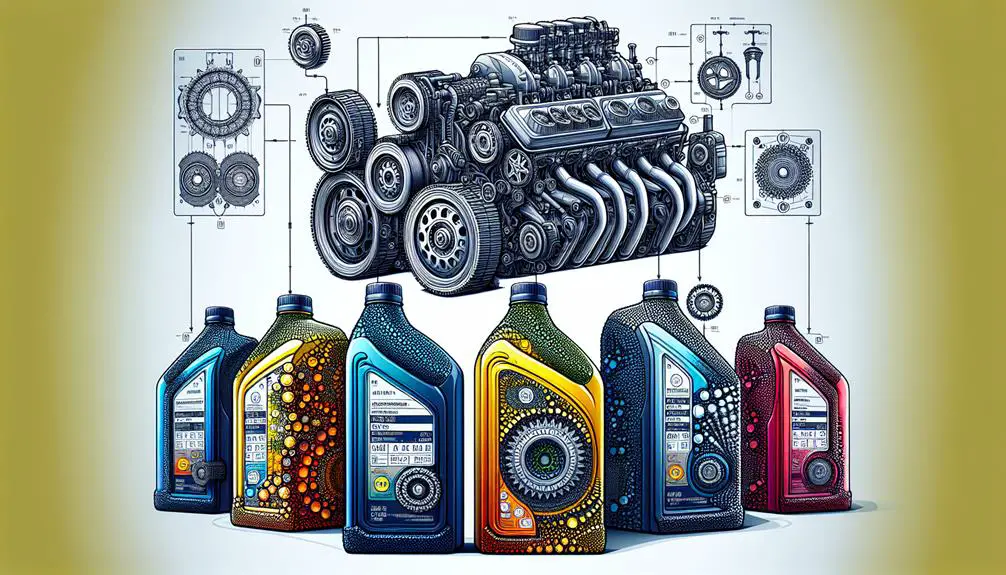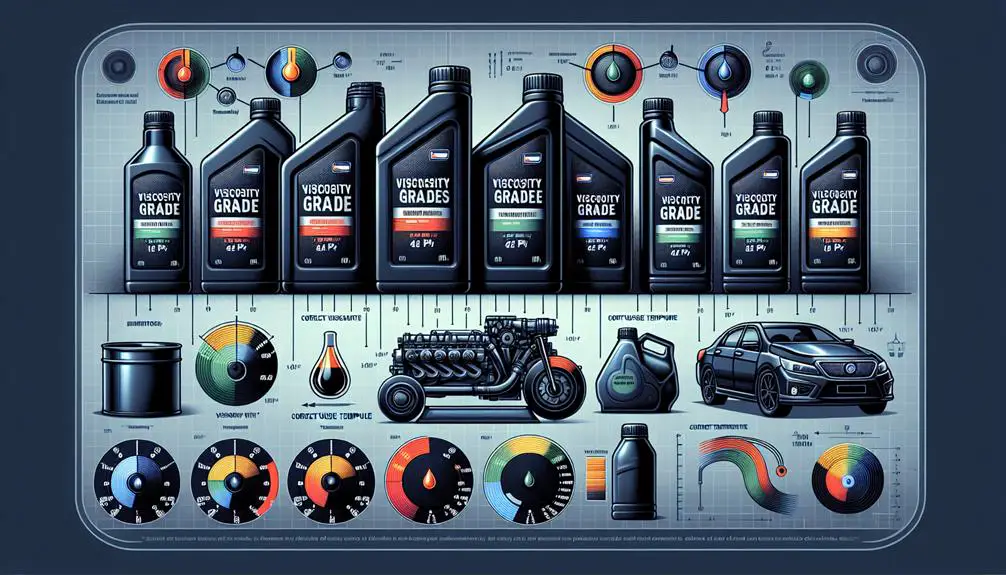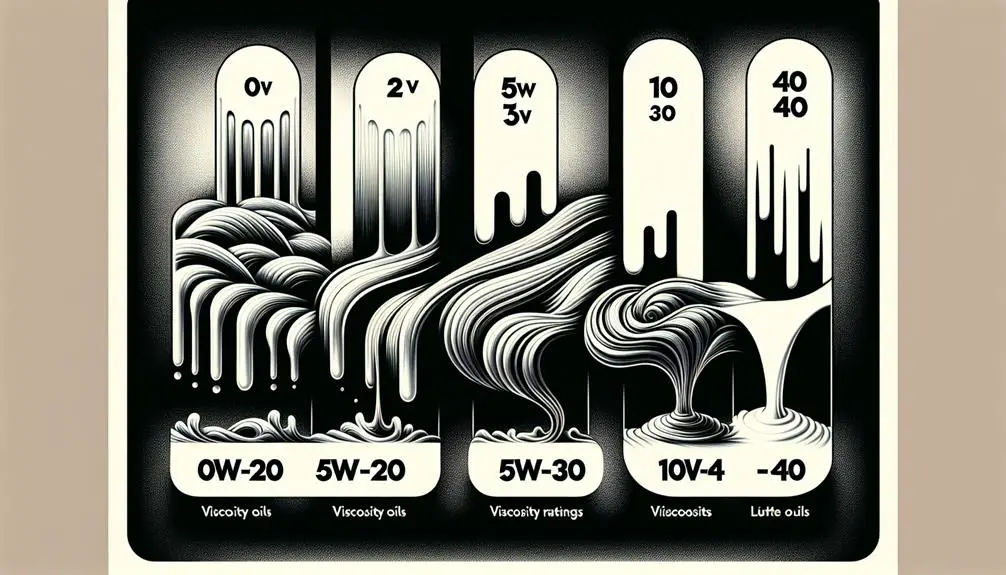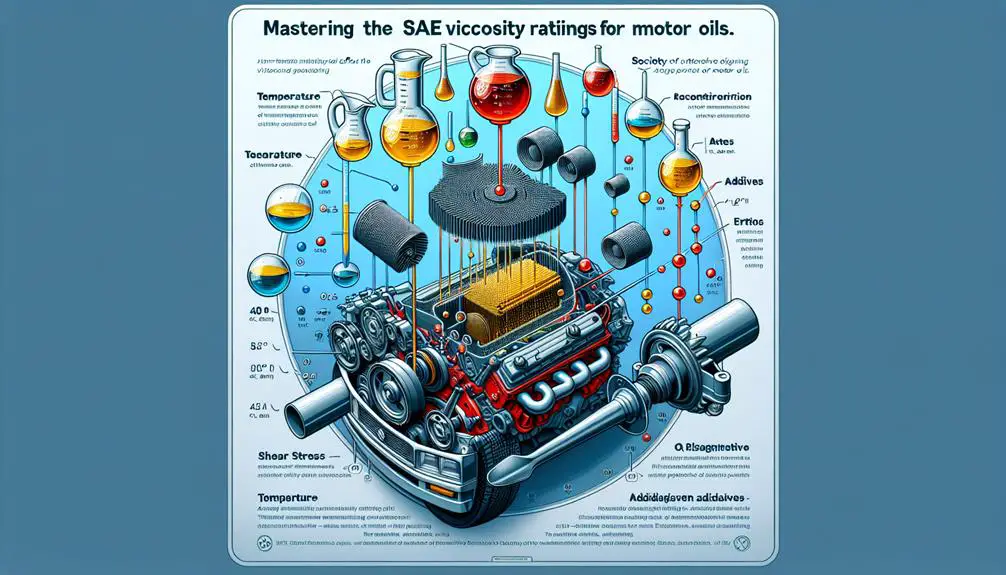Understanding SAE viscosity ratings for motor oils can be a game-changer for your vehicle's health. Imagine knowing exactly why a number like 10W-30 makes a significant difference in your engine's performance. It's not just about the numbers; it's about knowing how they impact your daily driving experience. Interested in discovering the secrets behind selecting the perfect lubricant for your engine? Stay tuned for insights that could transform the way you view motor oil choices.
Key Takeaways
- SAE ratings indicate oil flow in cold and high temps.
- Choose based on climate and driving conditions.
- Understand viscosity grades for engine protection.
- Multigrade oils adapt to temperature changes.
- Viscosity numbers crucial for selecting right oil.
Importance of Viscosity Ratings

Understanding the significance of viscosity ratings is crucial for maintaining peak engine performance and longevity. By grasping the viscosity ratings of motor oils, you empower yourself to make informed decisions about the lubricants you use in your engine.
This knowledge liberates you from uncertainty, allowing you to choose oils that match the demands of your vehicle's engine perfectly. Viscosity ratings indicate the oil's resistance to flow at different temperatures, ensuring that your engine is protected even in extreme conditions.
Ignoring viscosity ratings can lead to poor lubrication, increased wear and tear, and potentially costly engine damage. Embracing the importance of viscosity ratings gives you the freedom to optimize your engine's efficiency and durability.
Defining SAE Viscosity Ratings
Let's start by looking at the basics of SAE viscosity ratings. Understanding what these ratings mean can help you choose the right motor oil for your vehicle.
SAE Rating Basics
Explaining SAE viscosity ratings helps clarify the performance characteristics of motor oils. When you see an SAE viscosity rating like 10W-30 on a bottle of oil, it's not just a random number.
The 'W' stands for winter, indicating how the oil flows in cold temperatures. The lower the number before the 'W', the better the oil will flow in cold weather.
The second number represents the oil's viscosity at operating temperatures; in this case, 30. The higher the second number, the thicker the oil will be at high temperatures.
Understanding these basics empowers you to choose the right oil for your vehicle based on the climate and driving conditions you encounter.
Understanding Oil Viscosity
When selecting motor oil for your vehicle, it's important to grasp the significance of SAE viscosity ratings. Understanding oil viscosity can help you choose the right oil that suits your engine's needs. Viscosity refers to the oil's resistance to flow at different temperatures. The Society of Automotive Engineers (SAE) assigns viscosity grades to oils based on their flow characteristics. These grades are usually displayed on oil containers in the format XW-XX. The number preceding the 'W' indicates the oil's viscosity in cold temperatures, while the number following the 'W' represents the viscosity at operating temperatures.
To simplify this concept, take a look at the table below for a quick reference guide:
| SAE Viscosity Rating | Description | Example Applications |
|---|---|---|
| 5W-30 | Good for cold starts | Most modern cars |
| 10W-40 | All-season oil | Older vehicles |
| 20W-50 | Thicker oil | High-mileage or heavy-duty vehicles |
Understanding Viscosity Grades

When considering motor oils, understanding viscosity grades is essential for peak performance.
The importance of viscosity grades lies in their ability to indicate the oil's flow characteristics under different temperatures and conditions.
Additionally, knowing the significance of viscosity index can help you choose the right oil for your vehicle's engine.
Viscosity Grade Importance
Understanding the importance of viscosity grades in motor oils can greatly impact the performance and longevity of your vehicle's engine. Viscosity grades indicate how thick or thin an oil is, affecting its flow at different temperatures. This is essential because the right viscosity grade guarantees proper lubrication of engine components, reducing wear and tear.
Choosing the correct viscosity grade recommended by your vehicle's manufacturer is crucial for peak engine performance and fuel efficiency. Using the wrong viscosity grade can lead to issues such as increased friction, overheating, and poor engine function. For example, using a motor oil with a viscosity grade that's too low for your engine can result in inadequate lubrication, potentially causing damage over time.
On the other hand, using a viscosity grade that's too high may lead to difficulties starting your engine in cold weather.
Viscosity Index Significance
The significance of viscosity index lies in its ability to indicate how much an oil's viscosity changes with temperature fluctuations. A higher viscosity index means the oil's viscosity is less affected by temperature changes, providing better stability and protection for your engine.
Understanding viscosity index is vital because it helps you choose the right motor oil that can maintain consistent performance in varying temperatures.
When selecting motor oil, look for a higher viscosity index if you live in an area with extreme temperature variations. This guarantees that your oil will flow well in cold weather and maintain proper lubrication in hot conditions.
Differences Between Single and Multigrade Oils
Single-grade oils are formulated to perform at their best in a specific temperature range, while multigrade oils are designed to provide consistent protection across a wider range of temperatures.
Single-grade oils are straightforward – they're either designed for use in hot temperatures (SAE 30 and SAE 40) or cold temperatures (SAE 0W, SAE 5W).
However, multigrade oils offer the freedom to use a single oil that performs well in both hot and cold conditions. For instance, a 10W-40 oil will flow well in cold weather to guarantee proper lubrication during start-up, yet it will also maintain viscosity at high temperatures. This liberates you from the hassle of changing oils with the seasons, providing convenience and peace of mind.
Multigrade oils achieve this versatility through the use of polymer additives that expand and contract with temperature changes, ensuring your engine is always protected, no matter the weather.
Interpreting Viscosity Numbers

When selecting motor oils, consider how viscosity numbers indicate the oil's flow characteristics in different temperatures. Viscosity numbers, like 10W-30 or 5W-40, provide important information about the oil's behavior when the engine is cold and when it's hot.
The first number followed by the letter 'W' represents the oil's flow during cold starts, with lower numbers flowing better in cold conditions. The second number indicates the oil's viscosity at operating temperatures, with higher numbers providing better protection at high temperatures.
Understanding these numbers is key to choosing the right oil for your engine, ensuring proper lubrication in all conditions. Remember, the right viscosity oil will flow swiftly during start-up, protecting critical engine parts, and maintain proper lubrication when the engine is running hot.
Benefits of Using Correct Viscosity
Understanding the correct viscosity for your motor oil can lead to improved engine performance and longevity. By using motor oil with the right viscosity rating, you guarantee that your engine components are adequately lubricated, reducing friction and wear. This results in smoother operation and can even enhance fuel efficiency.
Using the correct viscosity oil also helps maintain consistent oil pressure, guaranteeing all parts of the engine receive proper lubrication at all times. This is essential for preventing overheating and unnecessary strain on the engine, ultimately extending its lifespan.
Moreover, when you choose the right viscosity for your motor oil, you're actively contributing to reducing emissions and protecting the environment. Proper lubrication helps the engine run cleaner and more efficiently, resulting in fewer harmful emissions being released into the air.
In essence, selecting the correct viscosity for your motor oil not only benefits your engine's performance and longevity but also plays a role in promoting a cleaner and healthier environment.
Factors Affecting Viscosity Ratings

When it comes to understanding viscosity ratings, two important factors to take into account are the impact of temperature and the importance of shear stability.
Temperature can greatly affect how thick or thin an oil becomes, influencing its performance in different conditions.
Additionally, shear stability plays a key role in maintaining consistent viscosity levels, especially in high-stress environments.
Temperature Impact on Viscosity
Temperature greatly influences the viscosity ratings of motor oils, impacting their performance under varying operating conditions. As the temperature changes, the viscosity of the oil can either increase or decrease. This aspect is crucial for ensuring that your engine receives proper lubrication regardless of the weather or driving conditions. Check out the table below to understand how temperature affects viscosity:
| Temperature Range | Viscosity Rating | Impact on Performance |
|---|---|---|
| Low | Thicker oil | Better protection in cold weather and high-load situations. |
| Moderate | Best-suited viscosity | Suitable for most driving conditions. |
| High | Thinner oil | Improved flow at higher temperatures, preventing engine stress. |
Shear Stability Importance
In considering motor oil performance, the importance of shear stability can't be understated, as it directly influences viscosity ratings and overall engine protection.
Shear stability refers to the oil's ability to maintain its viscosity and lubricating properties under mechanical stress, such as that experienced in high-pressure areas of an engine. When oil experiences shear, it can thin out, leading to decreased lubrication and potentially causing engine wear.
Choosing a motor oil with good shear stability can help prevent viscosity breakdown, ensuring excellent protection for your engine components. Factors such as polymer additives and base oil quality play a significant role in determining a motor oil's shear stability.
Choosing the Right Viscosity Grade
To select the appropriate viscosity grade for your motor oil, consider the operating conditions of your vehicle. The viscosity grade you choose should align with the temperature range your engine operates in.
For colder climates, a lower viscosity oil such as 5W-30 or 0W-20 is ideal to guarantee proper flow and lubrication during start-up. In contrast, hotter climates or high-performance engines may benefit from a higher viscosity oil like 10W-40 or 15W-50 to maintain stability under increased temperatures.
If you often drive in varying temperatures, a multi-grade oil like 10W-30 provides versatility. Additionally, heavy loads or towing may require a thicker oil to prevent breakdown under stress.
By understanding your vehicle's needs and the typical weather conditions you encounter, you can confidently select the right viscosity grade for excellent engine performance and protection.
Common Misconceptions About Viscosity

Don't fall into the trap of assuming that viscosity alone determines the effectiveness of motor oil in your vehicle. There are common misconceptions about viscosity that can lead to misinformation.
Here are some key points to keep in mind:
- Thicker isn't always better: While thicker oil may provide better protection in some cases, it can also lead to reduced fuel efficiency.
- Viscosity doesn't indicate quality: Just because a motor oil has a certain viscosity rating, it doesn't automatically mean it's of high quality.
- Temperature impacts viscosity: Viscosity changes with temperature, so what works well in one climate may not be suitable for another.
- Engine design matters: Different engines may require different viscosity grades, so understanding your specific vehicle's needs is crucial.
Understanding these misconceptions can help you make informed decisions when choosing the right motor oil for your vehicle.
Tips for Maintaining Optimal Viscosity
Maintaining ideal viscosity in your motor oil requires regular monitoring and adherence to recommended oil change intervals. Consistent checks on your oil level and quality can help guarantee that your engine is running smoothly.
When it comes to maintaining the best viscosity, consider using high-quality synthetic oils that are less prone to viscosity breakdown compared to conventional oils. Additionally, paying attention to your driving habits can impact the viscosity of your oil; frequent short trips may not allow the oil to reach its peak operating temperature, affecting its viscosity.
Be sure to follow the manufacturer's recommendations regarding oil change intervals based on your driving conditions. Overlooking these intervals can lead to viscosity issues and potentially damage your engine over time.
Frequently Asked Questions
Can Mixing Different Viscosity Grades of Motor Oil Cause Harm to My Engine?
Mixing different viscosity grades of motor oil can potentially harm your engine. This practice can lead to poor lubrication, increased wear and tear on engine components, and reduced performance.
It's essential to follow manufacturer recommendations for oil viscosity to guarantee peak engine health and performance. Avoid mixing different viscosity grades to prevent potential damage and maintain your engine's longevity.
Are There Any Environmental Impacts Associated With Using Specific Viscosity Grades?
When you opt for specific viscosity grades, you're like a maestro composing a symphony of environmental mindfulness. Your choice can harmonize with nature or create discord.
Thinner oils can enhance fuel efficiency, reducing emissions and promoting a cleaner atmosphere. Conversely, thicker oils may offer more protection but can lead to higher carbon footprints.
How Does the Age of My Vehicle Affect the Choice of Viscosity Grade?
When selecting viscosity grades for your vehicle, consider the age of your car. Older vehicles may benefit from thicker oils with higher viscosity grades to maintain proper engine lubrication and performance.
As engines age, they may develop wear and tear, and a higher viscosity grade can help compensate for this. Consult your vehicle's manual or a mechanic to make sure you choose the right viscosity grade based on your car's age.
Can Extreme Temperatures Affect the Performance of Motor Oil Viscosity?
In hot weather, motor oil can thin out, affecting its viscosity and lubricating properties.
Imagine a tropical drink on a scorching day; it gets watery and loses its richness. Likewise, extreme temperatures can cause oil to become too thin, leading to decreased engine protection.
Be mindful of this when selecting the right viscosity grade for your vehicle to guarantee peak performance in varying weather conditions.
Is There a Difference in Viscosity Ratings for Synthetic Versus Conventional Motor Oils?
When it comes to viscosity ratings, there's indeed a difference between synthetic and conventional motor oils.
Synthetic oils tend to have more consistent viscosity across a wider temperature range compared to conventional oils. This means that synthetic oils can offer better protection for your engine in both extreme cold and hot conditions.
Conclusion
You've discovered the secrets of SAE viscosity ratings for motor oils, becoming a master of engine maintenance.
Just like a skilled artist mixes colors on a palette to create a masterpiece, you now blend the perfect viscosity grade to keep your engine running smoothly.
Remember, choosing the right oil is like selecting the perfect brushstroke – it's essential for preserving your engine's performance and ensuring its longevity.
Keep up the good work!
